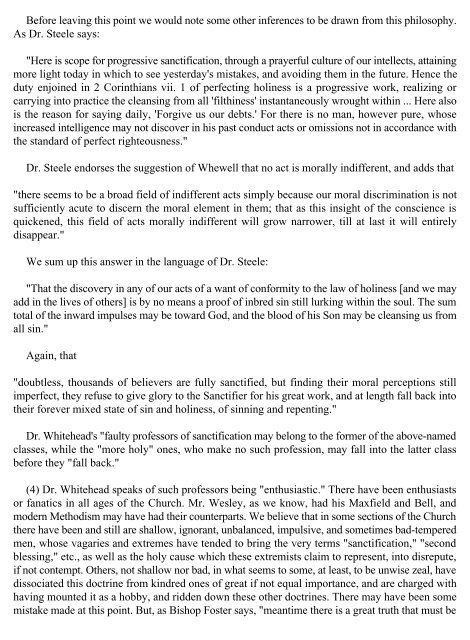Scriptural Sanctification - Media Sabda Org
Scriptural Sanctification - Media Sabda Org
Scriptural Sanctification - Media Sabda Org
You also want an ePaper? Increase the reach of your titles
YUMPU automatically turns print PDFs into web optimized ePapers that Google loves.
Before leaving this point we would note some other inferences to be drawn from this philosophy.<br />
As Dr. Steele says:<br />
"Here is scope for progressive sanctification, through a prayerful culture of our intellects, attaining<br />
more light today in which to see yesterday's mistakes, and avoiding them in the future. Hence the<br />
duty enjoined in 2 Corinthians vii. 1 of perfecting holiness is a progressive work, realizing or<br />
carrying into practice the cleansing from all 'filthiness' instantaneously wrought within ... Here also<br />
is the reason for saying daily, 'Forgive us our debts.' For there is no man, however pure, whose<br />
increased intelligence may not discover in his past conduct acts or omissions not in accordance with<br />
the standard of perfect righteousness."<br />
Dr. Steele endorses the suggestion of Whewell that no act is morally indifferent, and adds that<br />
"there seems to be a broad field of indifferent acts simply because our moral discrimination is not<br />
sufficiently acute to discern the moral element in them; that as this insight of the conscience is<br />
quickened, this field of acts morally indifferent will grow narrower, till at last it will entirely<br />
disappear."<br />
We sum up this answer in the language of Dr. Steele:<br />
"That the discovery in any of our acts of a want of conformity to the law of holiness [and we may<br />
add in the lives of others] is by no means a proof of inbred sin still lurking within the soul. The sum<br />
total of the inward impulses may be toward God, and the blood of his Son may be cleansing us from<br />
all sin."<br />
Again, that<br />
"doubtless, thousands of believers are fully sanctified, but finding their moral perceptions still<br />
imperfect, they refuse to give glory to the Sanctifier for his great work, and at length fall back into<br />
their forever mixed state of sin and holiness, of sinning and repenting."<br />
Dr. Whitehead's "faulty professors of sanctification may belong to the former of the above-named<br />
classes, while the "more holy" ones, who make no such profession, may fall into the latter class<br />
before they "fall back."<br />
(4) Dr. Whitehead speaks of such professors being "enthusiastic." There have been enthusiasts<br />
or fanatics in all ages of the Church. Mr. Wesley, as we know, had his Maxfield and Bell, and<br />
modern Methodism may have had their counterparts. We believe that in some sections of the Church<br />
there have been and still are shallow, ignorant, unbalanced, impulsive, and sometimes bad-tempered<br />
men, whose vagaries and extremes have tended to bring the very terms "sanctification," "second<br />
blessing," etc., as well as the holy cause which these extremists claim to represent, into disrepute,<br />
if not contempt. Others, not shallow nor bad, in what seems to some, at least, to be unwise zeal, have<br />
dissociated this doctrine from kindred ones of great if not equal importance, and are charged with<br />
having mounted it as a hobby, and ridden down these other doctrines. There may have been some<br />
mistake made at this point. But, as Bishop Foster says, "meantime there is a great truth that must be
















